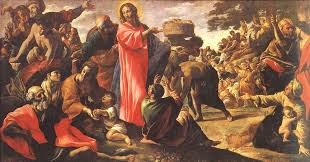DOCTRINE AND FAITH
(Jeremiah 20,7-9; Romans 12,1-2; Matt16, 21-27: 22ndSunday of Year A)
Last Sunday, we saw the eulogy, which Christ accorded to Peter, as well as his investiture as the head and foundation of the Church: Blessed are you Simon, son of Jona... You are Peter and upon this rock I will build my church. Today, on the other hand, we hear Jesus rebuke Peter in very strong terms: Get behind me Satan, you are an obstacle in my path. This boils down to mean: You are like Satan to me who is an obstacle in my effort to realise the will of God. This is because the way you (Peter) think is not God’s way but that of man. Last Sunday, Peter thought like God when he recognised Jesus as not only an exceptional person but also as the Messiah sent by God and the Son of God. Indeed at his profession of faith, Jesus declared: It is not flesh and blood that revealed this to you. This means, that it was not human reasoning but God’s revelation that helped Peter to come to that conclusion. In today’s gospel reading, we see Peter follow human reasoning when he did not accept the idea that Jesus was to suffer and die on the cross. At the mention that Jesus was to go to Jerusalem to suffer and die on the cross, Peter remonstrated with Jesus: This must not
happen to you. According to him, it was unthinkable. Thinking according to God means two things: The first is to accept Christ as the Son of God who was sent and consecrated by God the Father for the mission to save the world. The second is to also accept the scandal of the cross: this means the mystery of God made man who underwent crucifixion in order to save the world. He has to undergo crucifixion because it was the will of the Father in His programme of salvation. Jesus began to make it clear to his disciples that he was destined to go to Jerusalem. Jesus was destined, because it was willed by God the Father. From the onset, Jesus knew that he had to follow the will of the Father to the end.
To think like God is to understand that the disciple will have to follow his master. The master is Christ, who is the Way, the Truth and the Life. The disciple of Jesus should also be able to share in His destiny of sacrifice and suffering in order to participate in his destiny of glory. Jesus invites us to participate in his destiny when he declared in today’s gospel: If anyone wants to be a follower of mine, let him renounce himself and take up his cross and follow me. Every Christian should be the disciple of Jesus and to be really so he/she has to:
(a) to renounce himself/herself. This would mean that he should not accept nor recognise the inner disorder which he notices in himself as a result of original sin as legitimate. It means also that he is not to give in to tendencies of passion like pride, avarice, lust and in short, to selfishness. On the other hand, he is expected to endeavour, with the help of God, to create order and interior equilibrium, to allow reason and strength of will prevail over instinct and passion and to foster the triumph of love over egoism/self-centredness.
(b) has to take up his/her cross, just as Christ took up his own. Cross includes physical and mental suffering, hostilities, misunderstandings and derisions, which come our way as we profess and live out our faith. The Christian is called to co-operate in the redemption of the world through his suffering, carrying his cross together with Christ and uniting his sufferings with His.
(c) To be truly a disciple of Christ the Christian should be the one who follows Christ. He should be the one who follows the steps and the ways of Christ, his examples, comportment, thoughts, sentiments and in short, one whose life is in uniform with that of Christ.
St. Paul lends voice to the discussion on how to think like God and how to be a true disciple of Christ when he exhorts: Do not model yourselves on the behaviour of the world. This is because the world is a slave (according to St. John, the Apostle) to triple concupiscences of the flesh (lust and sensuous life), the eyes (avarice) and the pride of life (aspiration to power and lordship over others). The disciple of Christ has to fight and combat, energetically, the slavery of passion, for it not only leads to eternal damnation, but also does not really bring happiness in this life.
The havocs these triple concupiscences cause are tremendous: families are broken up, the society is in turmoil, one not only hears of rumours of wars, but sees the effect of wars and destruction of lives and properties, life is no more safe even in the broad day light, kidnapping and killings of human lives, corruption from top to bottom of the societal ladder, theft and robbery, alcoholism and drugging among our youths. How do we avert these evils of our societies? It is an up hill task which we have to begin now and from ourselves. We begin today by thinking like God and truly following Christ by modelling our lives, both in our thoughts and actions after his. Let us pray in the Eucharistic celebration of today that the good Lord may give us all the necessary graces we need in order to follow Christ by taking up the crosses of our daily life.
HappySunday!
+John I. Okoye
.jpg)

.jpg)
.jpg)
.jpg)
.jpg)


